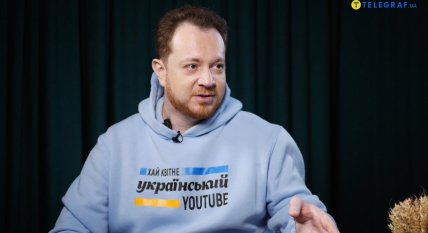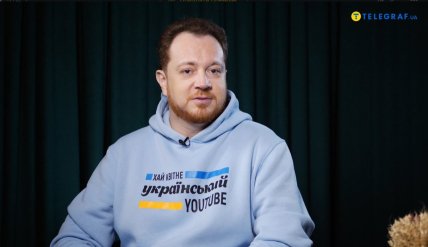"Kiev: a city in distress" - Vladlen Maraev discusses historical memory, Ukrainization, and his top 5 remarkable figures.
A hypothetical ranking of the five most remarkable historical figures without whom Ukraine's independence would have been impossible would undoubtedly be led by Bohdan Khmelnytsky for several reasons. However, this list would also include an unexpected figure.
In an interview with "Telegraf", co-author of popular YouTube channels "History Without Myths" and "10 Questions to a Historian," PhD candidate in history Vladlen Maraev shared his list of the greatest Ukrainians.
In the second part of the interview with the YouTube blogger, the discussion revolved around Putin's metamorphoses, whether Russia faces a new disintegration and when, conspiracy theories about the alleged "betrayal" of Ukraine by the West, as well as the pros and cons of the historian Timothy Snyder's high-profile project.
For insights on the hottest historical topics, some contemporary trends, and the rise of Ukrainian YouTube during the war, read the first part of the interview with Vladlen Maraev.
Watch the full video version of the interview with the renowned historian on our YouTube channel.
About "vatniks"
— Alongside the military front, the struggle against Russia continues in various spheres of public life, particularly concerning the so-called vatniks. How can we combat this "vatness" in the minds of certain citizens, and what tools are best for this?
— The confrontation [with Russia] occurs in various fields and on all levels. Often, the struggle for people's minds, particularly in the information domain, education, and even science, can have a more terrifying and lasting impact. It can influence perceptions, understanding of certain processes, and similar aspects for decades, if not centuries, by introducing specific [pro-Russian] narratives and stereotypes.
Vatniks essentially represent the fifth column [of Russia]. Unfortunately, they exist. I am convinced that over time, the circle of these individuals will continue to shrink. In fact, many of them are currently afraid to express themselves. Some, by the way, have changed their views. At the very least, there is a significant portion of relatively pro-Russian individuals who have become haters of Russia due to the large-scale invasion.
As for those who were not "cured" even by Russian missiles and drones, there is probably nothing more to be done. If these individuals are genuinely harmful, they should be prosecuted under the law as strictly as possible, but always within the framework of Ukrainian legal norms. They should be pursued as collaborators, traitors, and accomplices of the enemy. Undoubtedly.

Because martial law leaves no other choice. This is a matter of life and death. However, overall, I believe we are on the right path. The Ukrainization of all spheres continues.
On faceless renaming
— Are there any drawbacks in the new wave of Ukrainization, particularly regarding the approach to renaming streets, avenues, or settlements?
— There are excesses, as it was once said, "excesses on the ground": left-wing bias, right-wing bias (laughs). There are, in my opinion, unjustified decisions.
For example, I was very displeased with the recent renaming of Yuzhnoukrainsk to Pivdennoukrainsk, when there were splendid historical alternatives available. Specifically – Gard. This was a Cossack settlement, the center of the Buhogardovska palanka [of the Zaporozhian Host] in the 18th century. Why not name the city after this Ukrainian settlement (Yuzhnoukrainsk is located 1 km from the Gard site. — Ed.)?
Why opt for a completely faceless renaming and merely translate from Russian "Yuzhnoukrainsk" to "Pivdennoukrainsk"?!
Even cartographers, including Dmitry Vortman, have told me that such long city names like "Pivdennoukrainsk" are a nightmare for cartographers. Gard has only four letters. It's perfect. Plus, it has historical significance, truly our history.
To this day, for instance, they have not renamed Pershomaisk. Not only is this name in honor of May 1, but let’s even ignore its somewhat leftist political character. However, even the name in Russian sounds "Pershomaisk" and will not sound like "Petryshotravyansk." But God forbid if they rename it to "Pershotravnyansk." That would simply be terrible (laughs).
On the destruction of historical buildings in Kyiv
— In the context of neglecting the past, it is worth mentioning that, for example, in Kyiv, historical heritage is crumbling before our eyes, and amid numerous land and construction scandals, historical buildings are gradually disappearing. As a Kyivite, what do you see as the root of this evil, and do you feel saddened by the destruction of old structures, even those from imperial times?
— The root of the problem typically lies in the pursuit of profit: expensive land in the historical center, the opportunity to build something, to earn additional capital. This is mainly the cause.
It deeply saddens me not just as a Kyivite but as a historian. I would prefer to preserve all buildings that are, for example, over 100 years old, or perhaps over 50 years old. At the very least, those that existed before World War II, as well as everything that holds artistic value. Unfortunately, there are very few left in Kyiv, it seems there are now less than 1% of houses built before 1917. Kyiv, just 30-50 years ago, was largely a two- and three-story city, with vast areas of private housing in the central part. Almost every street had private homes.

Of course, the city is densifying, rapidly expanding, and will continue to expand because Kyiv will always be a center of attraction for people from all over Ukraine. After all, in Kyiv, there are jobs, careers, education, and the highest salaries. But it would be better to expand residential areas rather than build over the central part. To the greatest regret, the capital has historically been unlucky. Kyiv is an unfortunate city in this sense because it has been destroyed numerous times throughout history, from the distant Middle Ages to the present day.
Secondly, we have unique monuments that do not exist anywhere else in the world. The same St. Sophia Cathedral, Lavra, and many others have survived since the Middle Ages. These are what hold immense tourist potential and can attract foreigners. I am convinced that if we had better preservation of civil constructions, this potential would be even greater. I am, of course, referring to peaceful times, when they arrive in large numbers to visit, relax, and fully enjoy life here in Kyiv.
The more such landmarks are preserved, the greater the potential for Kyiv to attract foreigners. And, of course, this is also potential for Kyivites to take pride in their heritage, and for historians to have reason to be proud of the preservation of that heritage.
On the "export" of Ukrainian culture and science
— Continuing the topic of Ukraine's potential, what elements of history or public life could our country "export" to other nations to, so to speak, "sell" this to foreigners?
— In my opinion, we should not so much "sell" as promote Ukrainian culture and domestic science in the West because there is extremely little awareness of them. Very often, Russians simply appropriate them, claiming that they are not Ukrainian but Russian or Soviet.
We have plenty to showcase to the world: writers, painters, composers, theater figures, sculptors, and architects. We need to show that, unfortunately, many Ukrainians realized their potential outside of Ukraine. In the USA, Canada, Britain, Brazil, Argentina. And that was also a Ukrainian contribution.
It should be shown that Ukrainian culture is indeed diverse, rich, and magnificent. Not as straightforward as the Russians boast, claiming to be great or "the greatest." There is no need for that. Our culture is not worse or weaker than that of other peoples. We should not overly boast, but we also should not engage in self-deprecation, suggesting that we are somehow weaker or inferior. No! Ukraine simply hasn’t been given the chance to develop for too long. For a very long time. Repressions, terror, murders.
We also need to highlight the contributions of Ukrainian scientists in various fields of science, such as physics, chemistry, etc. Many diverse designers and inventors were Ukrainians or of Ukrainian descent. There are individuals with Ukrainian roots who have been Nobel Prize laureates but received the award as citizens of other countries. Because Ukraine did not exist as a state. This contribution also needs to be promoted, popularized, and communicated in other languages to foreign audiences.